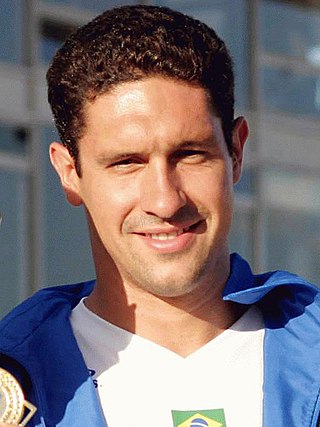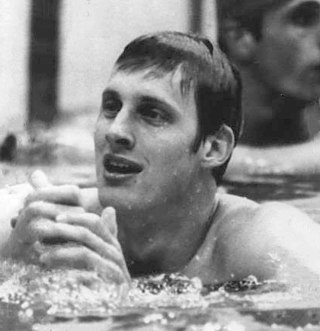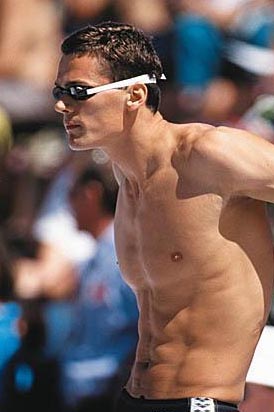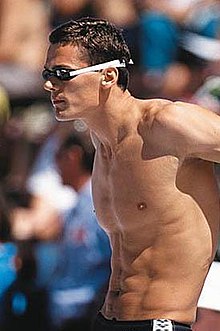
The men's 100 metre freestyle event at the 2004 Summer Olympics was contested at the Olympic Aquatic Centre of the Athens Olympic Sports Complex in Athens, Greece on August 17 and 18. There were 69 competitors from 62 nations. Nations had been limited to two swimmers each since the 1984 Games.

Gustavo França Borges is a Brazilian former competitive swimmer. He swam for Brazil in four Summer Olympic Games: 1992, 1996, 2000 and 2004. Borges has won the fourth-most Olympic medals of any Brazilian, with four —one in 1992, two in 1996 and one in 2000—only behind sailors Robert Scheidt and Torben Grael with five and gymnast Rebeca Andrade with six. He also has eight Pan American Games gold medals, the third-most of any Brazilian and only behind swimmer Thiago Pereira and table tennis player Hugo Hoyama. Borges was Brazil's flagbearer for the Closing Ceremony at the 2004 Summer Olympics.

The men's 100 metre freestyle event at the 1976 Summer Olympics took place between July 24 and 25. This was the first time in history that the 100m freestyle was swum under 50 seconds. There were 41 competitors from 27 nations. Nations had been limited to three swimmers each since the 1924 Games. The event was won by Jim Montgomery of the United States, the nation's second consecutive and tenth overall victory in the men's 100 metre freestyle. His countryman Jack Babashoff took silver. Peter Nocke's bronze was the first medal for West Germany in the event, though the United Team of Germany had won a bronze in 1964.

The men's 100 metre freestyle event at the 1992 Summer Olympics took place on 28 July at the Piscines Bernat Picornell in Barcelona, Spain. There were 75 competitors from 52 nations. Nations had been limited to two swimmers each since the 1984 Games. The event was won by Alexander Popov of the Unified Team. Gustavo Borges's silver was Brazil's first medal in the men's 100 metre freestyle since 1960. Stéphan Caron of France repeated as bronze medalist, the eighth man to win multiple medals in the event. It was the first time since 1968 that the United States had competed and not won the event and the first time since 1956 that the Americans had competed and not taken any medal, as Jon Olsen finished fourth and defending champion Matt Biondi came in fifth.

The men's 200 metre freestyle event at the 1996 Summer Olympics took place on 20 July at the Georgia Tech Aquatic Center in Atlanta, United States. There were 43 competitors from 36 nations, with each nation having up to two swimmers. The event was won by Danyon Loader of New Zealand, the nation's first medal in the men's 200 metre freestyle. Brazil also received its first medal in the event, with Gustavo Borges taking silver. Bronze went to Australia's Daniel Kowalski.

The men's 200 metre backstroke event at the 1996 Summer Olympics took place on 26 July at the Georgia Tech Campus Recreation Center in Atlanta, United States. There were 39 competitors from 33 nations. Each nation had been limited to two swimmers in the event since 1984. The event was won by Brad Bridgewater of the United States, with his countryman Tripp Schwenk taking silver. It was the first time since 1980 that one nation had two swimmers on the podium in the event. Bridgewater's victory was the United States' first in the event since 1984 and fourth overall. Italy earned its second consecutive bronze medal in the men's 200 metre backstroke, with Emanuele Merisi taking the honours this time.

The men's 100 metre freestyle event at the 2000 Summer Olympics took place on 19–20 September at the Sydney International Aquatic Centre in Sydney, Australia. There were 73 competitors from 66 nations. Nations have been limited to two swimmers each since the 1984 Games.

The men's 200 metre backstroke event at the 2000 Summer Olympics took place on 20–21 September at the Sydney Olympic Park Aquatic Centre in Sydney, Australia. There were 45 competitors from 38 nations. Each nation had been limited to two swimmers in the event since 1984. The event was won by Lenny Krayzelburg of the United States, with his countryman Aaron Peirsol taking silver. It was the second consecutive Games that Americans had finished one-two in the event. Bronze went to Matt Welsh of Australia, the nation's first medal in the event since 1980.

The men's 100 metre freestyle event at the 1984 Summer Olympics was held in the McDonald's Olympic Swim Stadium in Los Angeles, California, on July 31, 1984. There were 68 competitors from 45 nations. Nations were limited to two swimmers each, down from three in prior Games. The event was won by Rowdy Gaines of the United States, the nation's third victory in four Games—with only the boycotted 1980 Olympics missing. Overall, it was the eleventh victory for an American in the men's 100 metre freestyle, most of any nation. Mark Stockwell of Australia took silver. Swedish swimmer Per Johansson repeated as bronze medalist, only the seventh man to earn multiple medals in the event.

César Augusto Cielo Filho is a Brazilian competitive swimmer who specializes in sprint events. He is the most successful Brazilian swimmer in history, having obtained three Olympic medals, winning six individual World Championship gold medals and breaking two world records.
The men's 100 metre freestyle event at the 1988 Summer Olympics took place on 22 September at the Jamsil Indoor Swimming Pool in Seoul, South Korea. There were 77 competitors from 51 nations. Nations had been limited to two swimmers each since the 1984 Games.

The men's 100 metre freestyle event at the 1952 Summer Olympics took place between 26 and 27 July at the Helsinki Swimming Stadium. There were 61 competitors from 33 nations. Nations had been limited to three swimmers each since the 1924 Games. The event was won by Clarke Scholes of the United States, the nation's second consecutive and seventh overall victory in the men's 100 metre freestyle. Japan, absent from the 1948 Games after World War II, returned to the podium in the event with Hiroshi Suzuki's silver. Göran Larsson earned Sweden's first medal in the event since 1908 with his bronze.
Ravil Nachaev is an Uzbek former swimmer, who specialized in sprint freestyle and butterfly events. He is a three-time Olympian, and a gold medalist in the 50 m freestyle at the 2002 Asian Games in Busan, South Korea.
Ratapong "Nuk" Sirisanont is a Thai former swimmer, who specialized in breaststroke, but also competed in long-distance freestyle and individual medley. He is a four-time Olympian, a three-time Asian Games participant, and a seven-time SEA Games athlete (1991–2003). Regarded as Thailand's top swimmer, he has won a total of sixteen medals at the Southeast Asian Games since 1995, and six at the Asian Games, including two golds in the 200 and 400 m individual medley. At the 1996 Summer Olympics in Atlanta, Sirisanont became the first Thai swimmer to reach the final twice. Sirisanont is also one of three Southeast Asian swimmers, along with Malaysia's Alex Lim and Philippines' Miguel Molina, to train for the California Golden Bears in the United States, under head coach Nort Thornton.
Kim Min-suk is a retired South Korean swimmer, who specialized in sprint freestyle and backstroke events. He is a two-time Olympian, and a double medalist at the 2002 Asian Games in Busan.
Stavros Michaelides is a Cypriot former swimmer, who specialized in sprint freestyle events. He is a three-time Olympian, a triple medalist at the Mediterranean Games, and a former Cypriot record holder in the 50 m freestyle. In 2003, Michaelides was selected as one of eight Olympians to be the major pioneers of The Race Club in Islamorada, Florida.
Allan Murray is a Bahamian former swimmer who specialized in sprint freestyle events. He is a three-time Olympian, and a top 16 finalist in the 50 m freestyle at his second Olympic appearance in Atlanta. While studying in the United States, Murray was a member of Georgia Bulldogs swimming team under head coach Jack Bauerle.
Sergey Ashihmin (Russian: Серге́й Ашихмин; is a Russian-born Kyrgyzstani former swimmer, who specialized in sprint freestyle events. He is a two-time Olympian, and a former Kyrgyzstan record holder in the 50 and 100 m freestyle. While playing for the Russian senior team, Ashihmin also earned a silver medal, along with Denis Pimankov, Dmitry Chernyshov, and double Olympic champion Alexander Popov, in the 4×100 m freestyle relay at the 1999 European Aquatics Championships in Istanbul, Turkey.
Huang Chih-yung is a Taiwanese former swimmer, who specialized in sprint freestyle events. He is a two-time Olympian, and a bronze medalist at the 1998 Asian Games.
Kyle Chalmers, is an Australian competitive swimmer. He is a world record holder in the short course 100 metre freestyle, 4×100 metre medley relay, and long course 4×100 metre mixed freestyle relay. He is the Oceanian and Australian record holder in the short course 50 metre butterfly and 50 metre freestyle.











